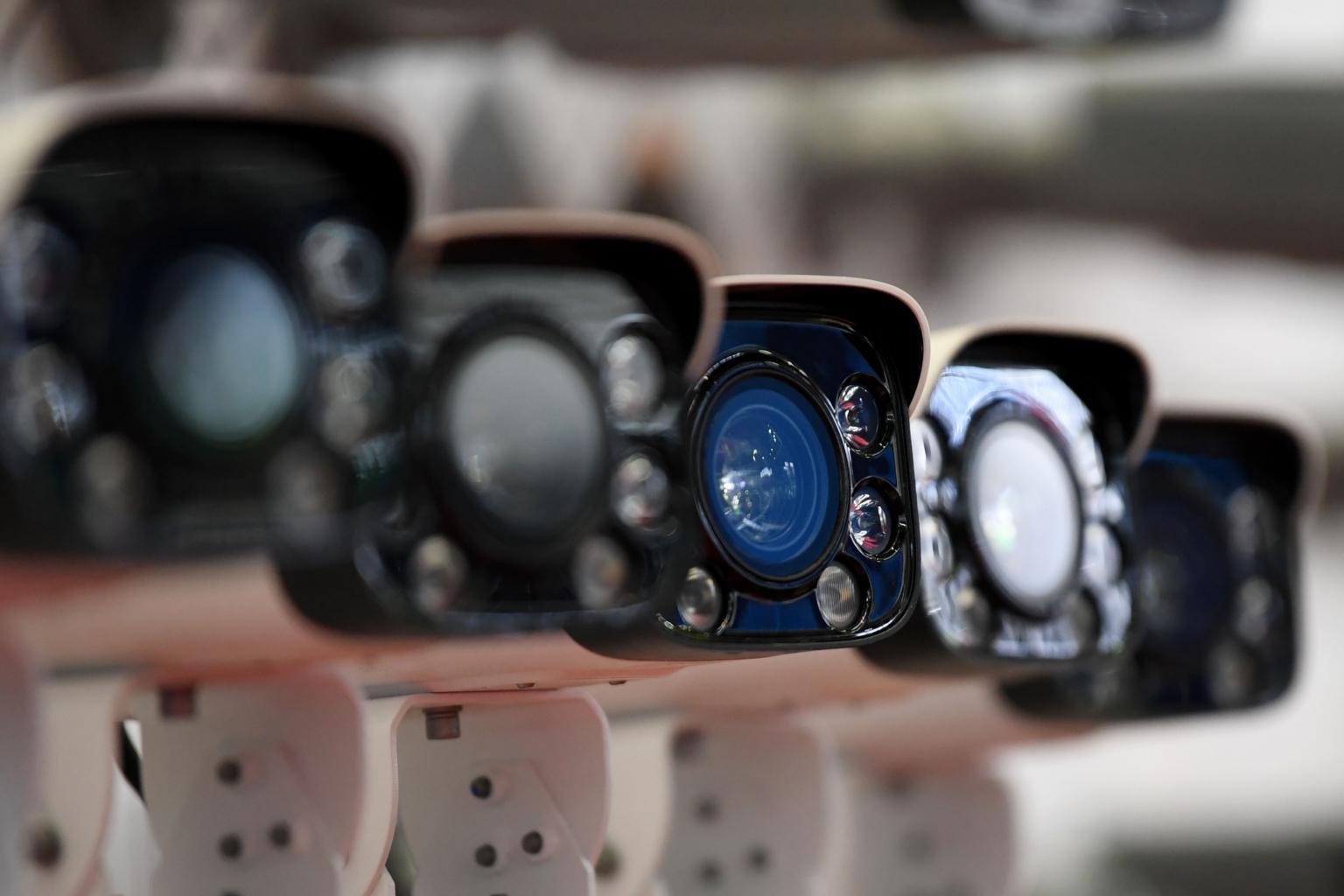Emotion recognition is China's new surveillance craze
Sign up now: Get insights on Asia's fast-moving developments

Surveillance cameras are displayed at the China Public Security Expo at the Shenzhen Convention and Exhibition Centre in Shenzen, China, on Oct 28, 2019.
PHOTO: AFP
SHENZHEN (FINANCIAL TIMES) - Emotion recognition was the crime prevention buzz-phrase on everyone's lips this week at China's largest surveillance tech expo, held in the southern tech hub of Shenzhen.
The technology, which is being rolled out at airports and subway stations to identify criminal suspects, is the latest development in crime prediction systems in the world's largest surveillance market, which already relies on facial and gait recognition, eye tracking and crowd analysis.
Emotion recognition systems have been installed in Xinjiang, a region in far western China where an estimated one million mostly Muslim minorities are held in internment camps. In October, the United States blocked eight Chinese artificial intelligence tech companies from buying US-made products on the grounds of alleged human rights abuses in Xinjiang.
"Using video footage, emotion recognition technology can rapidly identify criminal suspects by analysing their mental state... to prevent illegal acts including terrorism and smuggling," said Mr Li Xiaoyu, a policing expert and party cadre from the public security bureau in Altay city in Xinjiang. "We've already started using it."
The technology is mostly deployed at customs, he added, and identifies signs of aggressiveness and nervousness as well as stress levels and a person's potential to attack others.
Companies around the world, including Amazon, Microsoft and Google, are all developing emotion recognition, but scientists say the technology does not work very well.
"This technology is still a bit of a gimmick and is unlikely to be rolled out on a large scale in the next three to five years," said Ge Jia, an influential Beijing-based technology blogger.
"At present, only a few schools and public security bureaus have products that include this type of technology," said Zhen Wenzhuang at Baidu's booth at the expo, adding it had not been fully developed for commercial use.
A representative from facial recognition company Megvii, who declined to be named, said emotion recognition technology was being widely developed and used within government, particularly public security bureaus.
Mr Li said: "We work with all kinds of companies in Xinjiang including Hikvision, Uniview, Dahua and Tiandy. Only companies that are strong in AI can really succeed in this field and of course the two biggest companies in this field are Alibaba and Tencent." He added that the Xinjiang government also worked with them.
Almost 14 billion yuan (S$2.7 billion) of infrastructure investment poured into Xinjiang in 2017 to develop its smart cities, far outstripping Beijing, the second-largest recipient of investment, which received 1.69 billion yuan, according to Qianzhan Industrial Research Institute, a Chinese consultancy.
More than 1,500 companies displayed their wares at an expo attended by Chinese government officials, police officers, businesses, individuals and overseas visitors.
Huawei, one of China's leading AI companies, had a visible presence, as it uses its competitive advantage in AI and 5G to muscle into the public security industry. "Huawei has attended the expo for a long time but they've really started developing this aspect of their business over the past two years," said Mr Michael Yang, secretary-general of the expo's organising committee.
"We have a lot of room for growth, this market used to be worth 300-400 billion yuan, now it's about 800 billion yuan and I think very soon we will see it crack one trillion yuan, particularly once we have 5G," said Yu Hu, deputy head of Huawei's Intelligent Video & Data Analytics product line, referring to the whole security equipment market. China's three telecoms carriers launched their 5G mobile phone services on Thursday (Nov 7).
Companies such as Hikvision and Dahua, which have traditionally dominated the security equipment market are being increasingly challenged by China's Internet giants like Huawei, SenseTime and Ping An, all vying for a cut of the lucrative market.
"The boundaries of this space are becoming increasingly blurred, now Hikvision isn't purely just a security equipment company, we are also in the firefighting and fire safety space and we're trying to find new ways to create value for our customers," said Mr Xu Zhijun, the vice-head of Hikvision.
Companies were wary about discussing the impact of the US-China trade war and recent sanctions from the Trump administration, but noted there were fewer US companies at the expo compared to previous years.
Mr Xu put on a brave face, saying the US block was "only having a short term impact" on Hikvision, and many vendors said Chinese companies were increasingly reliant on HiSilicon, Huawei's wholly owned semiconductor subsidiary.
"We haven't been as negatively impacted as Dahua and Hikvision which mostly fill orders from the US government and big brands, but we've still lost some US clients," said a brand manager at security equipment manufacturer Shenzhen Wanjiaan Interconnected Technology, who spoke on condition of anonymity.
"The drop-off in attendance from US companies at the expo isn't just because of the ongoing trade war," said Mr Yang. "It is also because we're seeing Chinese companies increasingly dominate this industry globally."


